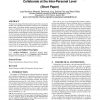396 search results - page 58 / 80 » Embodied Computation |
121
click to vote
ACMDIS
2008
ACM
15 years 4 months ago
2008
ACM
Participatory Design is a design approach that provides a popular set of techniques for designing interactive systems in collaboration with end-users. Technology probes are one of...
ATAL
2008
Springer
15 years 4 months ago
2008
Springer
While talking, people may move heavily their arms around, remain expressionless, or even display subtle facial movements... These differences may arise from personality, cultural,...
119
click to vote
ATAL
2008
Springer
15 years 4 months ago
2008
Springer
We discuss the design of the Intermediary Agent's brain, the control module of an embodied conversational virtual peer in a simulation game aimed at providing learning experi...
CSCWD
2008
Springer
15 years 4 months ago
2008
Springer
Task partition is a critical problem of collaborative conceptual design. Aiming at the shortage that current task partition methods don't accord to innovative functional reas...
104
Voted
AAAI
1994
15 years 3 months ago
1994
Most Artificial Intelligence programs lack generality because they reason with a single domain theory that is tailored for a specific task and embodies a host of implicit assumpti...




